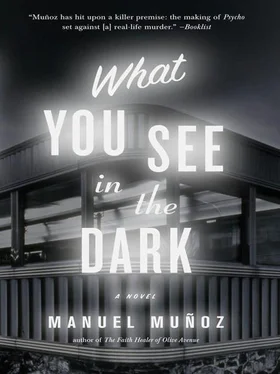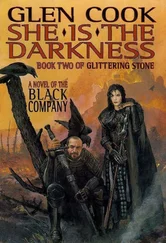Vernon moved his hand to her knee.
She pulled away as if touched by fire. “Vernon …,” she said.
“Arlene, I just want you to know …”
“Take me home,” she said. “Please.”
What she had wanted was a quick drive home, but instead she had to endure the slow ease of the dirt lane all the way out to the main road. Their silence deepened and she kept expecting Vernon to offer a measure of apology. He stayed quiet, and Arlene felt the tears form and fall. She had no choice but to wipe at her cheeks and she turned away to the side window to do so, but she knew Vernon had seen her.
“I’m real sorry, Arlene …,” Vernon began when he had pulled his pickup to a stop back at the motel parking lot, but by that time, Arlene had already opened the door to the truck cab and jumped out. She hurried to the house, listening for Vernon’s truck to gear. It finally did as her hands shook, trying to get the key into her front door lock.
She felt deeply shamed for the rest of the afternoon. That’s what the feeling was, in the end, a deep shame. Arlene could not identify what it was about Vernon or his gesture or her tears that prevented her from touching her dinner that evening, that kept her with her eyes open all night, lying in bed with her hands involuntarily smoothing her stomach, as if she were trying to keep something from rising. Whatever it was, though, felt exactly like all of those afternoons in the first months after Dan had disappeared, the eyes in the café silently watching her, felt exactly like the moment she had moved through the darkness of the picture house, her shadow laughable in its anonymous anger. She was no one that anyone had to worry about, and to think that someone like Vernon might ever have held feelings for her. What a fool not to have seen it, not to have believed it. All this time, she had been thinking of herself in the way others saw her — an abandoned wife, a lowly waitress, an aging woman whom no one could even bother to gossip about anymore — but Vernon himself had not.
The next morning, she rose with a bleary resolution to apologize to Vernon, somehow send him a sign that she, in fact, understood what he was offering, that his gesture was not unlike the shine of the camera bulbs in the movie magazines, a promise of a different life altogether. He had her best interests in mind, saw her as belonging in another space, not the motel, maybe not even the café.
But Vernon did not come in for his usual breakfast, Cal sitting alone with his newspaper. The next morning, he did not come either. Cal made no mention of Vernon’s absence and she was too embarrassed to pose an innocent question to him about Vernon’s whereabouts, to ask if Vernon had taken ill. Arlene let the anticipation sit. The small dot within her knew better. It knew in the same way she knew something when she stepped out of the picture house, when she saw the taillights of Dan’s escape, when she rested her head on Frederick’s chest on their wedding night, when she spotted her brother on the road, years and years and years ago.
Things change, the small dot told her. But she was not going to be able to.
This was July 1961. Vernon never came into the café again. That fall, Cal married a clerk from the shoe store, and the two had a baby, and the farmers who came in to fill where Vernon and Cal had once sat were not much interested in either Arlene or her daily newspaper reading, the outside world being something they would rather not deal with.
She wished now that she could remember the day — the exact day — when she stopped looking at the café door in anticipation. The day she stopped waiting for a policeman to come in to report on Dan, Vernon to come in with his hat in his hands. Time just passed.
It took a year from that moment for the freeway to open, in summer 1962.
Talk around the café was about the boom in business along Union Avenue. The freeway fed the street like a vein with Los Angeles traffic. The café bustled, but her motel vacancy rate jumped, more than half the rooms empty, some weekends without a single customer at all. When Arlene began to recognize a set of regulars — truckers who went all the way north to Oregon and Washington State — she suspected that many of them stopped not only out of loyalty and familiarity but out of a bit of pity as well.
She watched as Union Avenue underwent construction to accommodate the new traffic, the buzz in downtown all about the flood of anticipated business. Construction crews busied themselves with roof work, facade restructurings, paint jobs, drills busting up the concrete sidewalks. Arlene wasn’t fooled by any of it. The small dot inside her told her to watch the condition of the vinyl seating in the café, the minuscule rips becoming long, jagged tears. It told her to watch as the summer season went by and the owner neglected to freshen up the paint. It told her to watch as the pedestrian traffic began to lessen, the cars inching along the street to the far end, where the town had been dazzled by the newer strip malls and a Texaco gas station selling hot dogs. She kept putting breakfast plates on the table, but now news was about heart attacks and strokes, her sturdy men not doing well in the heat like they used to. The tips got smaller, the hands holding the coins a little sheepish about what they were able to put down. She felt the café slip right through the town’s fingers, the way it stopped being the center of anything, and out in the world, the Cubans threatened, but the small dot within her confirmed that this was the inevitability of all things. The world meant nothing because this was the life she had chosen, this space with plate-glass windows from floor to ceiling, which looked more shoddy by the year.
The president was shot and killed in Dallas and the girls in the kitchen hovered around the TV set, their hands on the antenna to bring in the hazy news. The motel got so bad that Arlene took to letting out some of the rooms at the far end to the café girls who got in trouble with a baby but had no man around. The Los Angeles paper gave her news of the boiling race relations in the South. She had dreams of Kennedy, the president smiling at her with enormous, bloody teeth. Slowly, the familiar faces of the farmers began to disappear, more and more of them.
Things change, but she wasn’t ever going to.
Around town, she was known as just Arlene after all.
When she looked up from the counter, eyes away from the newspaper, it was another year gone, another time coming, the light in the café window sometimes blunt, sometimes wavering, but she was powerless to ever make it appear otherwise.
That was exactly how the years were going to race, now that she had nothing.
You can’t go back in, ma’am —the voice of the theater concession clerk coming back to mock her.
When she looked up from the counter, it was 1968 and she was fifty-six years old. It was as if she’d never been anybody’s anything.
“Arlene,” said one of the girls during a break. She was the youngest sibling of one of the girls Arlene used to supervise, years ago, but now here was proof yet again of change. Her name was Peggy.
“Are you going to watch Petula Clark next week?” Peggy asked. “Do you like her?” She pointed to a picture in the newspaper.
“I do, actually,” Arlene replied. She peered down to the newspaper and followed the girl’s finger to the article.
“It says they might not air her special because she touched a black man,” the girl said, her voice a little louder than it needed to be, gleeful at how she’d caused the slight head raises from some of the older farmers.
“Oh, now …” Arlene began to read the article. “It’s Harry Belafonte.”
“So why is it such a big deal?”
“You know how people are,” Arlene said, but she read the rest of the article, which told her about local affiliates being left to choose whether to broadcast the event. Inside, she held a quiver of disbelief and anticipation over how angry the show sponsors had been about Petula Clark touching Harry Bela-fonte, the fine line being walked. What kind of touching was it, these two being so harmless? She continued through the rest of the article and then handed the newspaper back to the girl. “That’s some stuff.”
Читать дальше












